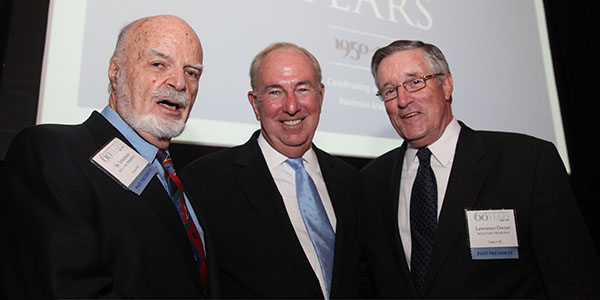 Those who worked with Sy J. Schulman during his time in city, county and state politics didn”™t always agree with him.
Those who worked with Sy J. Schulman during his time in city, county and state politics didn”™t always agree with him.
But most, if not all, agreed that Schulman would fight tooth and nail to defend the best interests of his clients ”“ the people of Westchester County ”“ in a manner rarely exhibited in politics today.
Westchester lost one of its great architects and visionaries Sept. 1 when Schulman died in his White Plains home at age 86. He had pancreatic cancer.
Schulman is survived by Rosalind Jordan Schulman, his wife of 64 years, his sons Ethan and Dan Schulman, and granddaughters Markita and Juliet. A service was held Sept. 3 at Bet Am Shalom in White Plains, where he and his wife were members.
With a career in politics and business spanning more than four decades, Schulman departed from the political scene in 1997 after a four-year term as White Plains mayor, where he spearheaded the creation of White Plains Vision, a program that led to the large-scale redevelopment of the city”™s downtown area, appearance and infrastructure.
While he may no longer be a household name, Schulman”™s contemporaries say he left his mark on much of what makes up modern-day Westchester, from its center and the county seat of White Plains to its parkland and parkways.
“He was quite a guy ”“ politically and intellectually ”“ a real gentlemen,” said former Westchester County Executive Andrew P. O”™Rourke, who was in office from 1983 to 1998. “He was a great wit, but that never took away from his determination to do what was right.”
O”™Rourke said he and Schulman would, from time to time, grab a bite to eat and “we would really let our hair down and I would tell him the problems I was having with the GOP and he would tell me what the Democrats were trying to do to him.”
“He understood that a lot was accomplished through understanding each other”™s position and also understanding that compromise made the world go round,” O”™Rourke said. “We never took a position that was harmful to the people. Maybe our parties didn”™t care for what we did but we slept better.”
Born in Brooklyn in 1926, Schulman enlisted in the U.S. Navy after graduating from Stuyvesant High School, serving from 1944 to 1946.
After leaving the Navy, Schulman enrolled at Cooper Union School of Engineering, where he received a master”™s degree in civil engineering, and in 1954 he received a master”™s degree in planning from Columbia University.
Schulman became Westchester County”™s chief planner in 1955 after serving as an engineer for the U.S. Bureau of Reclamation in Phoenix and subsequently as an assistant in the New York City Department of Planning, and served as planning commissioner for the county from 1962 to 1968.
During his time with the county, he was instrumental in a major expansion of the county”™s park system and in the planning of some of the region”™s most-traveled highways, including Interstates 287 and 684.
Schulman in 1968 was named general manager of the newly formed State Park Commission for New York City by Gov. Nelson Rockefeller.
Two years later, he was asked to work with the Westchester branch of the state Urban Development Corporation ”“ which today does business as Empire State Development Corp. ”“ where he fought for the development of low- and middle-income housing, particularly in nine northern Westchester communities.
Alfred DelBello frequently came into contact with Schulman as mayor of Yonkers and later as Westchester County Executive from 1974 to 1982.
DelBello said he opposed the plan to bring affordable housing developments to northern Westchester on the grounds that there weren”™t enough transportation options available for low earners; however, he said he understood and appreciated the way Schulman fought for the plan.
“I knew Sy Schulman my entire career,” DelBello said. “He was tenacious; more like a bulldog when expressing his views. He was never reticent.”
Beginning in 1973, Schulman would serve as president of the Westchester County Association for nearly two decades. All the while, “it was advocacy, not adversarial,” DelBello said of Schulman”™s approach.
William M. Mooney, president of the WCA, described Schulman as “one of the best advocates I”™ve ever known for Westchester business.”
“He would never take no for an answer ”“ in a positive way,” Mooney said. “He was such an unbelievably great advocate. And he was a good man ”“ a really good man”¦He cared about the public, he cared about what happened to business and his entire life was devoted to that and making it better.”
Schulman would go on to serve as acting chairman of the Westchester Playland Commission, when in 1980 the county government assumed control over the park”™s management, and as chairman of the White Plains Planning Board, before being elected to the White Plains Common Council and subsequently being elected mayor.
Developers Robert Weisz, of RPW Group Inc., and Robert Weinberg, of Robert Martin Co., characterized Schulman”™s vision as being unique among his peers.
“The best way to describe him is as a visionary and a dreamer,” Weisz said. “His real love was planning and he saw White Plains not the way it was, but he had a vision for it and he worked very hard on that vision.”
For his part, Weinberg said his and Schulman”™s paths frequently crossed, “always with respect, even if not agreement, since he came through every walk of government life while I came from real estate development.”
However, he said, “our fondness for each other kept our minds attuned to the long-term health and infrastructure of the county generally and White Plains specifically. He will be missed as a force, but his vision leaves a permanent mark.”Â
Bob Rozycki contributed to this report



















